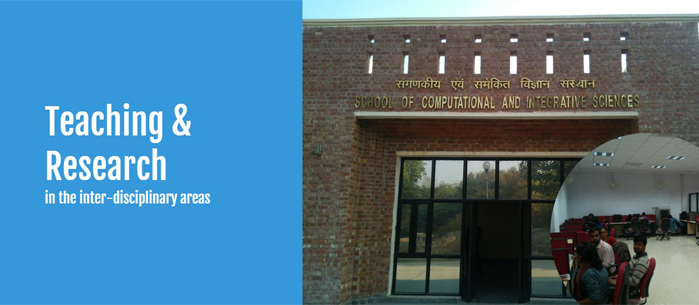पूर्व २००१ में स्थापित स्कूल ऑफ इंफॉर्मेशन टेक्नोलॉजी (एसआईटी) था और जो २०१० में उसका नाम स्कूल ऑफ़ कम्प्यूटेशनल एंड इंटेग्रेटिव साइंसेस (एस सी & आई एस) में बदला गया, स्कूल कम्प्यूटेशनल जीनोमिक्स, बायोइनफॉरमैटिक्स ड्रग डिस्कवरी, डाटाबेस मैनेजमेंट सिस्टम बायोलॉजी, हाई परफॉर्मेंस कंप्यूटिंग और कृत्रिम बुद्धि के अंतर-अनुशासनात्मक क्षेत्रों में शिक्षण और अनुसंधान प्रदान करता है। स्कूल का उद्देश्य समाधान खोजने के लिए विज्ञानों की विभिन्न शाखाओं में अपनाई जाने वाली कम्प्यूटेशनल और विश्लेषणात्मक दृष्टिकोणों को नया रूप देना और एकीकृत करना है।विज्ञान में तेजी से प्रगति और अत्याधुनिक प्रौद्योगिकियों एक बड़े पैमाने पर अनुसंधान को सक्षम और संचालित करती हैं, जिससे नवाचार करने का अवसर प्रदान करता हैं। स्कूल के शैक्षणिक और अनुसंधान कार्यक्रमों वर्तमान में कम्प्यूटेशनल के कोर क्षेत्र और सिस्टम जीव विज्ञान पर भविष्य जटिल प्रणाली, उच्च घनत्व डेटा विश्लेषण, सैद्धांतिक जैवभौतिक रसायन • और कम्प्यूटेशनल तंत्रिका विज्ञान के अध्ययन पर जोर देने के साथ ध्यान केंद्रित कर रहे हैं।
- कम्प्यूटेशनल गेनोमिक्स
- डेवलपमेंट ऑफ़ टूल्स इन बायोइन्फरमेटिक्स
- स्ट्रक्चर बेस्ड बायोइन्फरमेटिक्स एंड इन सिलिको ड्रग डिस्कवरी
- डेटाबेस मैनेजमेंट
- मिक्रोऑररय एनालिसिस एंड डाटा माइनिंग
- सिस्टम्स बायोलॉजी
- काम्प्लेक्स सिस्टम स्टडीज
 कोर्सेज: हम प्रदान करते हैं …..
कोर्सेज: हम प्रदान करते हैं …..
स्कूल ऑफ़ कम्प्यूटेशनल एंड इंटेग्रटीवे साइंसेज (पूर्व में स्कूल ऑफ़ इनफार्मेशन टेक्नोलॉजी), जवाहरलाल नेहरू यूनिवर्सिटी, वर्तमान में कम्प्यूटेशनल एंड सिस्टम बायोलॉजी और बायोइनफॉरमैटिक्स के लिए सेंटर होस्ट करता है, डिपार्टमेंट ऑफ़ बायोटेक्नोलॉजी भारत सरकार की उत्कृष्टता केंद्र, और कॉम्प्लेक्स सिस्टम्स के सेंटर, यूजीसी द्वारा XIIवीं योजना में पेश किया गया हैं। स्कूल प्रोग्राम्स में कम्प्यूटेशनल एंड सिस्टम्स बायोलॉजी और बायोइन्फरमेटिक्स: वर्ष २००० में एक उन्नत पीजी-डिप्लोमा बायोइनफॉरमैटिक्स शुरू हुआ, एक दो साल एम.टेक.२००६ से कम्प्यूटेशनल और सिस्टम बायोलॉजी में डिग्री, और एक प्री-पीएच डी. प्रोग्राम कम्प्यूटेशनल बायोलॉजी एंड बायोइन्फरमेटिक्स में वर्ष २००९ से प्रदान की गई है। स्कूल ने इन कार्यक्रमों इनफार्मेशन टेक्नोलॉजी, बायोइन्फरमेटिक्स, लाइफ साइंसेज /बायोटेक्नोलॉजी, फिजिकल एंड केमिकल साइंसेज, दूसरों के बीच में कई विषयों से इनटेक को प्रोत्साहित किया है।
पाठ्यक्रम के बारे में अधिक जानें
 |
 |
 |
 |
 |
